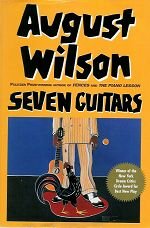For Black History Month, I read “Seven Guitars,” a play by August Wilson. “Seven Guitars” is part of his Pittsburgh Cycle. August Wilson’s plays chronicle the black experience in Pittsburgh. His characters live, love, laugh, and build families in the fragile safety of their changing communities while facing many of the same injustices of society.
Wilson was born and grew up in the Hill District of Pittsburgh. He wrote “The Pittsburgh Cycle,” ten plays exploring 100 years of the African American experience. The plays are also known as “The Century Cycle.” Each play is set in a different decade of the twentieth century. The plays were not written in chronological order. Wilson let the time-period be decided by a line of dialogue that came to him. He imagined who would say it and as the character came to life in his imagination, Wilson focused on his character and started building the story. He received Pulitzer prizes for drama for “Fences” and “The Piano Lesson.” His childhood home at 1727 Bedford Avenue in Pittsburgh was declared a historic landmark by the State of Pennsylvania and was added to the National Register of Historic Places in 2013. The August Wilson Center for African American Culture is in Pittsburgh.
“Seven Guitars” opened January 21, 1996, at the Goodman Theater with Viola Davis playing the role of Vera and Jerome Preston-Bates playing Floyd.
“Seven Guitars,” tells the story of the fictional character, Floyd “Schoolboy” Barton.
It begins and ends with his death offering flashbacks of his life and the events leading up to his death. Barton was a blues guitarist and recording artist in the 1940s.
For his first recording, Barton had been promised $38.00 and the opportunity for his name to appear as the artist. He was only given $25 and a bottle of whiskey by his white “manager.” After being picked up for “vagrancy” by white police officers in Chicago, Floyd has served 90 days in jail. He has returned to Pittsburgh after his release with a letter from a recording studio in Chicago inviting him back to make another record because his first recording has become an unexpected hit.
Floyd goes to the home of his on again off again girlfriend Vera to persuade her to go back to Chicago with him. A group of his friends is in her yard and the story of their lives is interwoven with his story.
Wilson uses a rooster to symbolize black men and their struggle to be heard in society. The rooster seems out of place in the Hill District of Pittsburgh but being taken from the country was not his choice. His crowing annoys the neighbors, but how can he be expected to be anything other than a rooster? How can a man be expected to remain quiet when he’s constantly being denied fair and equitable treatment by society?
I’m drawn to Wilson’s plays because of his characters. They live full and rich lives despite living in or near what we would consider poverty. They laugh, cry, eat, drink, dance, and make love. Some characters give in to despair and others give into temptation and commit horrible acts, but most of Wilson’s characters face life with quiet dignity and unfaltering faith.
The Pittsburgh Cycle included these plays:
“Gem of the Sea” set in 1904 (premiered in 2003)
“Joe Turner’s Come and Gone” set in 1911 (premiered in 1984)
“Ma Rainey’s Black Bottom” set in 1927 in Chicago (premiered in 1984)
“The Piano Lesson” set in 1936 (premiered in 1990)
“Seven Guitars” set in 1948 (premiered in 1995)
“Fences” set in 1957 (premiered in 1987)
“Two Trains Running” set in 1969 (premiered in 1991)
“Jitney” set in 1977 (premiered in 1982)
“King Hedley II” set in 1985 (premiered in 1999)
“Radio Golf” set in 1990 (premiered in 2005)
Photo Credit August Wilson image:
By Source, Fair use, https://en.wikipedia.org/w/index.php?curid=2824531
Photo Credit “Seven Guitars” Book Jacket:
By Source, Fair use, https://en.wikipedia.org/w/index.php?curid=7333202







